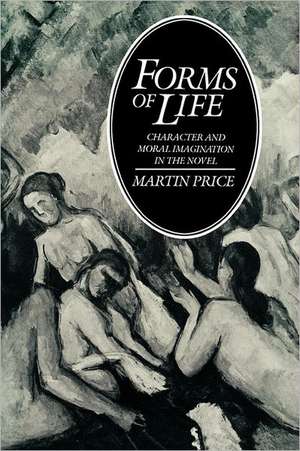Forms of Life: Character and Moral Imagination in the Novel
Autor Martin Priceen Limba Engleză Paperback – 15 iul 2011
The novel contains imagined lives that achieve a kind of meaning and intensity our own lives do not. Out of the novelist’s moral imagination—the breadth and depth of his awareness of human motivations, tensions, and complexities—emerge fictional persons through whom we learn to read ourselves. This eloquent book, exploring fictional lives in crucial moments of choice and change, stresses both their difference from and their deep connections with life.
Martin Price writes here about ways in which character has been conceived and presented in the novels of the nineteenth and early twentieth centuries. Beginning with chapters that cogently argue the artistic value of character, Price then deals with the different forms character has taken in individual novels. His first discussions center on authors—Jane Austen, Stendhal, Charles Dickens, George Eliot, and Leo Tolstoy—who define individuals by their adherence or opposition to social norms. The next chapters deal with novelists for whom the moral world is largely internalized. The characters of Henry James, Joseph Conrad, D.H. Lawrence, and E.M. Forster live in society and act upon it, but the authors are particularly concerned with the confusions, terrors, and heroism that lie within consciousness. The last chapter uses novels about the artist by James Joyce, Virginia Woolf, and Thomas Mann in order to apprehend the process by which experience is transformed into art.
Avoiding both formalistic and moralistic extremes, this new book by a distinguished critic helps us recover a fuller sense of literary form and the forms of life from which it emerges.
Martin Price writes here about ways in which character has been conceived and presented in the novels of the nineteenth and early twentieth centuries. Beginning with chapters that cogently argue the artistic value of character, Price then deals with the different forms character has taken in individual novels. His first discussions center on authors—Jane Austen, Stendhal, Charles Dickens, George Eliot, and Leo Tolstoy—who define individuals by their adherence or opposition to social norms. The next chapters deal with novelists for whom the moral world is largely internalized. The characters of Henry James, Joseph Conrad, D.H. Lawrence, and E.M. Forster live in society and act upon it, but the authors are particularly concerned with the confusions, terrors, and heroism that lie within consciousness. The last chapter uses novels about the artist by James Joyce, Virginia Woolf, and Thomas Mann in order to apprehend the process by which experience is transformed into art.
Avoiding both formalistic and moralistic extremes, this new book by a distinguished critic helps us recover a fuller sense of literary form and the forms of life from which it emerges.
Preț: 405.84 lei
Nou
Puncte Express: 609
Preț estimativ în valută:
77.66€ • 80.62$ • 64.76£
77.66€ • 80.62$ • 64.76£
Carte tipărită la comandă
Livrare economică 22 martie-05 aprilie
Preluare comenzi: 021 569.72.76
Specificații
ISBN-13: 9780300180206
ISBN-10: 0300180209
Pagini: 374
Dimensiuni: 156 x 235 x 24 mm
Greutate: 0.57 kg
Editura: Yale University Press
Colecția Yale University Press
ISBN-10: 0300180209
Pagini: 374
Dimensiuni: 156 x 235 x 24 mm
Greutate: 0.57 kg
Editura: Yale University Press
Colecția Yale University Press
